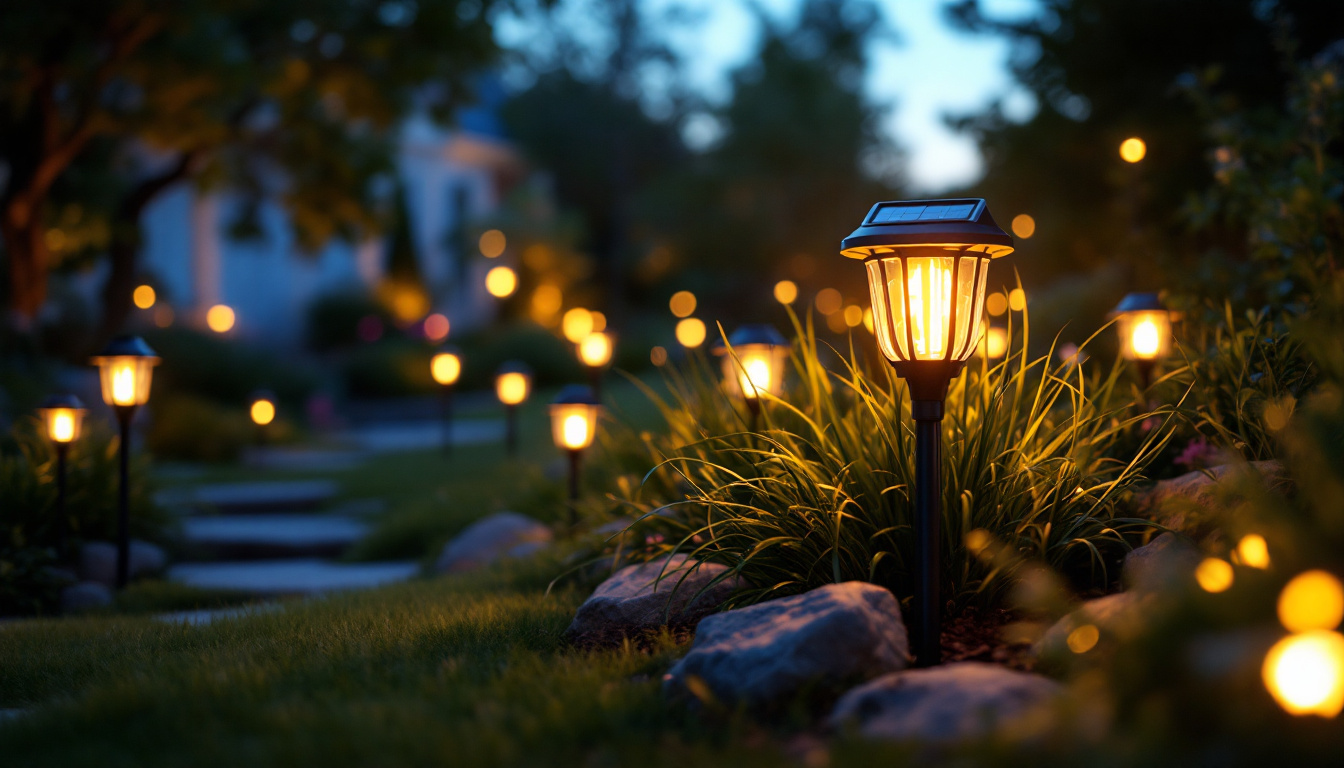
Solar lights have gained immense popularity in recent years, especially among homeowners and businesses looking for sustainable lighting solutions. These lights harness solar energy through photovoltaic cells, converting sunlight into electricity. However, a common question arises: do solar lights need direct sunlight to function effectively? Understanding this aspect is crucial for lighting contractors who aim to provide the best solutions to their clients.
At the core of solar lights are solar panels that absorb sunlight during the day. This energy is stored in rechargeable batteries, which power the lights during the night. While direct sunlight is ideal for optimal energy absorption, solar lights can still function with indirect sunlight or even on cloudy days. This flexibility can be a selling point for contractors, as many clients may have concerns about the reliability of solar lighting in less-than-ideal weather conditions. Additionally, advancements in solar technology have led to more efficient solar cells that can harness energy even in low-light conditions, making solar lights a viable option for various geographic locations.
Several factors influence the performance of solar lights beyond just direct sunlight. The angle of the solar panel, the duration of sunlight exposure, and the quality of the solar cells all play significant roles. For instance, if a solar light is positioned in a shaded area, it may not receive enough sunlight to charge fully, leading to diminished performance. Contractors should educate clients on these factors to help them make informed decisions about placement and installation. Furthermore, the geographical location and seasonal variations can also impact solar light efficiency; for example, areas with longer daylight hours will naturally yield better performance compared to regions with shorter days during winter months.
There are various types of solar lights available, each with unique features and benefits. Pathway lights, floodlights, and decorative lights can all serve different purposes in outdoor settings. Understanding the specific needs of a project allows lighting contractors to recommend the most suitable type of solar light. For example, pathway lights may require less direct sunlight than floodlights, which may need a more robust solar panel for optimal performance. Additionally, some solar lights come equipped with motion sensors, allowing for enhanced security features by illuminating only when movement is detected. This not only conserves battery life but also adds an extra layer of safety for residential and commercial properties alike.
For lighting contractors, offering solar lighting solutions can significantly enhance service offerings. As the demand for eco-friendly and energy-efficient products continues to rise, contractors who specialize in solar lighting can position themselves as industry leaders. Here are some key benefits that contractors can leverage.
Solar lights are often more cost-effective in the long run compared to traditional lighting solutions. They require no electricity from the grid, which can lead to substantial savings on energy bills for clients. Additionally, the installation of solar lights is generally simpler and less expensive since they do not require extensive wiring or electrical work. This cost-effectiveness can be a strong selling point for contractors when discussing project budgets with clients. Furthermore, many solar lighting products come with warranties that can last several years, providing clients with peace of mind and further reducing long-term costs associated with replacements or repairs.
With growing concerns about climate change and environmental sustainability, many clients are looking for ways to reduce their carbon footprint. Solar lights provide an excellent solution, as they utilize renewable energy and reduce reliance on fossil fuels. By promoting solar lighting, contractors can appeal to environmentally conscious clients and contribute to a more sustainable future. Additionally, the production and installation of solar lights often generate fewer greenhouse gas emissions compared to traditional lighting systems, making them a more responsible choice. Contractors can also highlight the potential for solar lights to enhance biodiversity in outdoor spaces, as they can be designed to minimize light pollution, thereby protecting nocturnal wildlife.
Another advantage of solar lights is their low maintenance requirements. Once installed, they typically require minimal upkeep, such as occasional cleaning of the solar panels to ensure optimal performance. This aspect can be particularly appealing to clients who prefer hassle-free solutions. Contractors can emphasize this benefit when discussing the long-term value of solar lighting systems. Moreover, many modern solar lights are equipped with advanced technology, such as motion sensors and smart controls, which can further reduce energy consumption and enhance functionality. This innovation not only adds convenience for users but also allows contractors to showcase their commitment to providing cutting-edge solutions that align with the latest trends in energy efficiency.
While solar lights offer numerous benefits, there are also challenges that lighting contractors must address. Understanding these challenges can help contractors provide better solutions and manage client expectations effectively.
One of the most significant challenges with solar lights is their dependence on weather conditions. Regions with frequent cloudy days or limited sunlight may experience reduced performance from solar lights. Contractors should assess the local climate and advise clients accordingly, potentially recommending hybrid systems that combine solar with traditional lighting to ensure reliability.
Although solar lights can be cost-effective over time, the initial investment may be higher than traditional lighting options. Clients may hesitate to invest upfront, especially if they are unfamiliar with the long-term savings potential. Contractors should be prepared to present a clear cost-benefit analysis, illustrating how solar lights can save money in the long run.
The quality of the batteries used in solar lights can significantly impact their performance and longevity. Low-quality batteries may not hold a charge effectively, leading to shorter operational times and diminished brightness. Contractors should prioritize high-quality solar lights with reliable batteries and educate clients about the importance of investing in durable products.
To maximize the effectiveness of solar lights, contractors should follow best practices during installation. Proper installation can significantly enhance the performance and longevity of solar lighting systems.
Placement is critical for solar lights to function effectively. Contractors should assess the site to identify areas that receive the most sunlight throughout the day. Ideally, solar panels should be positioned at an angle that allows for maximum exposure to sunlight. Additionally, avoiding shaded areas from trees, buildings, or other structures is essential for optimal performance.
Although solar lights require minimal maintenance, regular checks can help ensure they continue to operate efficiently. Contractors should advise clients to clean the solar panels periodically and inspect the lights for any signs of wear or damage. This proactive approach can help extend the lifespan of the solar lighting system.
Education is key when it comes to solar lights. Contractors should take the time to explain how solar lights work, their benefits, and any limitations. Providing clients with information on how to maximize the performance of their solar lights can lead to increased satisfaction and referrals. Consider creating user-friendly guides or hosting workshops to help clients understand their solar lighting systems better.
The solar lighting industry is continually evolving, with new technologies and innovations emerging regularly. Staying informed about these trends can help lighting contractors remain competitive and offer cutting-edge solutions to clients.
One of the most exciting trends in solar lighting is the integration of smart technology. Smart solar lights can be controlled remotely via smartphones or other devices, allowing users to adjust brightness, set timers, or even change colors. This technology not only enhances convenience but also allows for more efficient energy use. Contractors can explore smart solar lighting options to cater to tech-savvy clients.
Advancements in battery technology are also making solar lights more efficient. Newer batteries can hold a charge longer and provide brighter illumination, even in low-light conditions. Contractors should keep an eye on these developments and consider recommending products with the latest battery technology to clients.
As solar lighting becomes more mainstream, design innovations are emerging. From sleek, modern aesthetics to decorative options that blend seamlessly with landscaping, the variety of solar lights available is expanding. Contractors can benefit from staying updated on design trends, allowing them to offer clients a range of stylish options that meet their functional and aesthetic needs.
In summary, solar lights do not necessarily require direct sunlight to function effectively, making them a versatile option for various environments. Lighting contractors can leverage the benefits of solar lighting, including cost-effectiveness, environmental impact, and low maintenance requirements, to enhance their service offerings. By addressing challenges, following best practices for installation, and staying informed about industry trends, contractors can empower clients to make informed decisions about solar lighting solutions.
As the demand for sustainable and energy-efficient lighting continues to grow, contractors who embrace solar technology will be well-positioned to thrive in the evolving market. By understanding the intricacies of solar lights and effectively communicating their benefits to clients, lighting contractors can play a pivotal role in promoting a greener future.
Ready to elevate your lighting solutions and offer your clients the best in solar technology? At LumenWholesale, we provide lighting contractors with exceptional, spec-grade solar lights at unbeatable wholesale prices. Our commitment to quality and affordability ensures that you can deliver reliable and high-performance lighting for every project without the burden of inflated costs. With our hassle-free bulk buying and free shipping, you can stock up on premium lighting effortlessly. Don’t compromise on quality or value—choose LumenWholesale for your lighting needs and make the smart, sustainable choice for your business. Discover our extensive selection and take advantage of the best value in wholesale lighting by visiting Wholesale Lighting at the Best Value today.

Discover why solar garden lights are becoming an essential tool for lighting contractors.

Discover essential best practices for electrical wall plugs tailored specifically for lighting contractors.

Discover the essential insights lighting contractors need to meet client expectations when it comes to light fixture sconces.

Discover the key factors that distinguish leading lighting contractors in the solar door light industry.